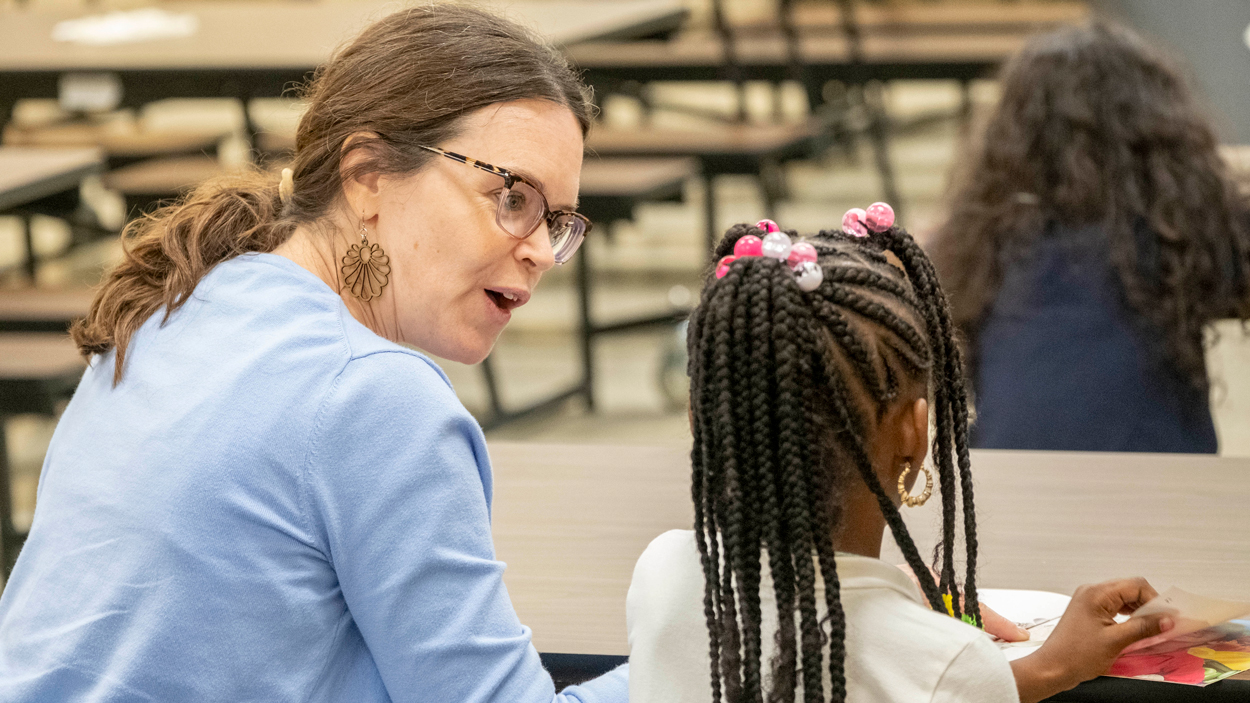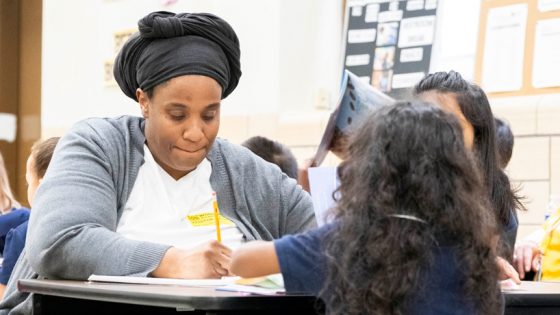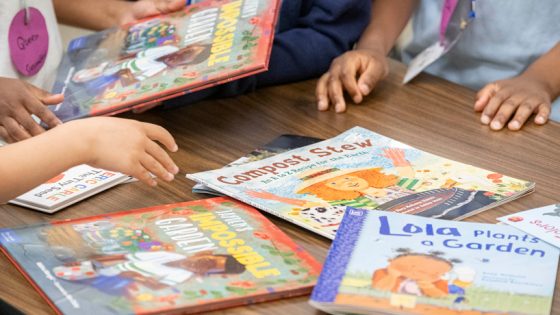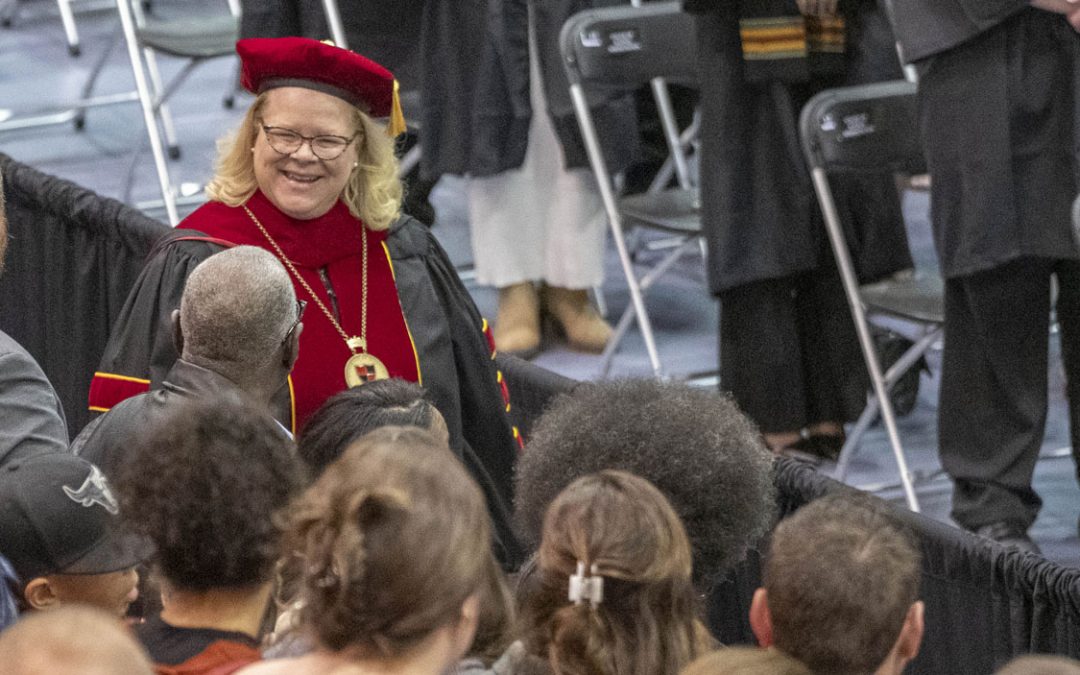
Rebecca Rogers, Curators’ Distinguished Professor and the E. Desmond Lee Endowed Professor of Tutorial Education, reads with a student last month at Woerner Elementary School. The New Leaf Literacies initiative integrated lessons about gardening and the environment with responsive, project-based literacy education. (Photos by Derik Holtmann)
There were a few moments when Cassetta Johnson knew that the New Leaf Literacies initiative was making an impact at Woerner Elementary School.
In one memorable instance, a student was flipping through a book about amphibians and stopped on a page featuring an axolotl – a prehistoric looking salamander – and enthusiastically demanded an explanation.
“He says, ‘What is this on this page!’” Johnson recalled with a laugh.
Without prompting, another student expressed his fondness for “Farmer Will Allen and the Growing Table,” a book about the real-life urban farmer and innovator, because he could see himself in the protagonist.
Those are just two examples of the joy and curiosity Johnson witnessed as a consulting literacy tutor with New Leaf Literacies. The innovative program is a partnership between the E. Des Lee Tutorial Initiative in the College of Education at the University of Missouri–St. Louis and Woerner Elementary School, which integrates lessons about gardening and the environment with responsive, project-based literacy education.
Over the course of three weeks this spring, UMSL literacy tutors and Woerner teachers collaborated to provide intensive literacy instruction to 40 kindergarten students for 90 minutes a day. The students participated in eco-themed reading and writing activities, but they also grew seedlings and planted vegetables. At the end of the program, each student received a certificate to commemorate the experience.
Rebecca Rogers, Curators’ Distinguished Professor and the E. Desmond Lee Endowed Professor of Tutorial Education, and Inda Schaenen, a scholar in residence with the E. Des Lee Tutorial Endowment, worked with Woerner Principal Kathy Matthews to spearhead the project.
“This is an example of a literacy initiative that came out of our partnership between community organizations, E. Des Lee Tutorial Initiative’s literacy tutors and scholars in residence who have expertise in literacy and project-based learning,” Rogers said.
Putting down roots
New Leaf Literacies is rooted in the College of Education literacy faculty’s ongoing work in the St. Louis community. Woerner, located in the Holly Hills neighborhood of south St. Louis, has been part of the UMSL Literacy Clinic since 2021. That laid the groundwork to pilot the initiative at the school.
The UMSL Literacy Clinic is comprised of several collaborative learning sites, including local school districts, community organizations and an online clinic that provides tuition-free literacy tutoring grounded in the sciences of reading and literacy. At Woerner Assistant Professor Doris Villarreal leads a clinic site where UMSL education students are matched one-on-one with students who need additional reading and writing support with evidence-based literacy instruction. The E. Des Lee Tutorial Endowment also provides resources for author visits and additional literacy tutoring.

Cassetta Johnson, consulting literacy tutor and UMSL graduate student, works on a writing exercise with two students.
The clinic sites have been very successful over the years, and Rogers said the aim is now to build them into “learning ecologies,” expanding UMSL’s literacy work in new ways. Rogers and Schaenen had implemented New Leaf Literacies at another organization this past fall, and Matthews expressed an interest in bringing the initiative to Woerner.
“We are always looking to elevate what we do here at Woerner, and it’s because of Dr. Rogers and her love of literacy and making sure that our kids are exposed to so much good literacy that we continue this partnership,” Matthews said. “This literacy and garden project was something that blossomed as we were brainstorming, because spring is here. We were thinking what we could pilot to see what that would look like. Instead of just talking about the garden, how can we make that connection between literacy and the garden?”
The school was also an ideal candidate for expansion because of its existing garden.
“There was a lot of interest and teacher expertise around gardening,” said Schaenen, a former English language arts teacher, founder of Project Lab St. Louis and researcher who brought this expertise to the curricular design of the learning ecology. “Gregory James has gardened. Elizabeth Buehler has a grow tower in her classroom. So, the opportunity was there for teacher interest and teacher expertise at the kindergarten grade level to merge with this initiative on UMSL’s part. There was very much a synthesis of our sets of interests and ideas.”
Sowing seeds
The overarching idea is to provide literacy enrichment in areas such as phonics, phonemic awareness, comprehension, word work and writing within an environmental framework. There are similar existing initiatives, but in researching them, Rogers and Schaenen found they lacked the cohesion they envisioned.
“It’s our experience that sometimes when the environmental focus is emphasized, the literacy work is backgrounded,” Rogers said. “We really wanted to integrate responsive literacy instruction within an environmental framework.”
Rogers and Schaenen added that literacy teachers can play an important role in educating today’s young people about the environment and climate change. Teachers realize the importance of analyzing information, building comprehension across sources and authoring a wide range of texts to generate sustainable futures.
To that end, UMSL’s two consulting literacy tutors – Johnson and Dana Pierson, both UMSL students – worked in concert with Woerner educators to focus on four key subjects: air, food, soil and water. Each week, the students were reading, learning and inquiring about those elements in small groups.

Student browse a collection of books focusing on four key subject areas: air, food, soil and water. UMSL donated the books used in the program to Woerner Elementary School’s library.
The groups each included students with a mix of reading levels to provide opportunities for classmates to bond and work together. The small-group structure offered several times a week also created an environment for “high-dosage tutoring,” where tutors could more easily cater to the needs of individual students in consultation with the classroom teachers.
Johnson explained that one group participated in a read-aloud of a book while other groups simultaneously worked at three literacy stations. Those activities included word work, studying words and phonics patterns from that day’s read-aloud book; structured literacy, guided and independent reading; and journaling.
The latter seemed to be particularly impactful. Pierson said students were encouraged to draw things they might find in a garden and spell related words like “seed,” but they also answered prompts such as, “How are you feeling today?” and “How do you take care of the earth?”
“It was great to see how they were feeling,” she said. “You know, a lot of them circled multiple emotions. They didn’t just circle one.”
Cultivating success
Across the board, the group was inspired by how eagerly the students responded to the initiative and their willingness to try new things.
“It’s been great,” said Angie Sample, UMSL alum and Woerner kindergarten teacher. “They’ve been really engaged with the word work, the read-alouds and then transferring that learning and knowledge when we went and planted the garden outside.”
The tangible nature of the initiative, being able to actually get their hands in the dirt, helped reinforce what they were reading. Johnson added that she thought the approach made “literacy come alive” for the children.
“It starts with the assumption that students can, and will, build from their language experience of reading about the world – in this context, their school, the garden, the environment – and then connect that to the words that they’re reading,” Rogers said. “Making those connections is absolutely essential for young students as they’re growing as readers. Not only so that they learn letter names and sounds, but so that they start to find joy and passion in reading and in the world.”
The team plans to bring New Leaf Literacies back to Woerner next school year. Ideally, Matthews would like to expand it slightly by adding an at-home component, but it remains to be seen whether that’s possible. For now, both parties are happy to celebrate bringing the program to fruition this year and creating an example of innovative, joyful literacy education for other educators.
“I knew working with UMSL would definitely meet the mission of helping our kids learn to read, learn how to decode, all of those things that go along with that,” Matthews said. “I just knew it was going to be something special, and that’s what we have here with UMSL and Woerner working together.”














